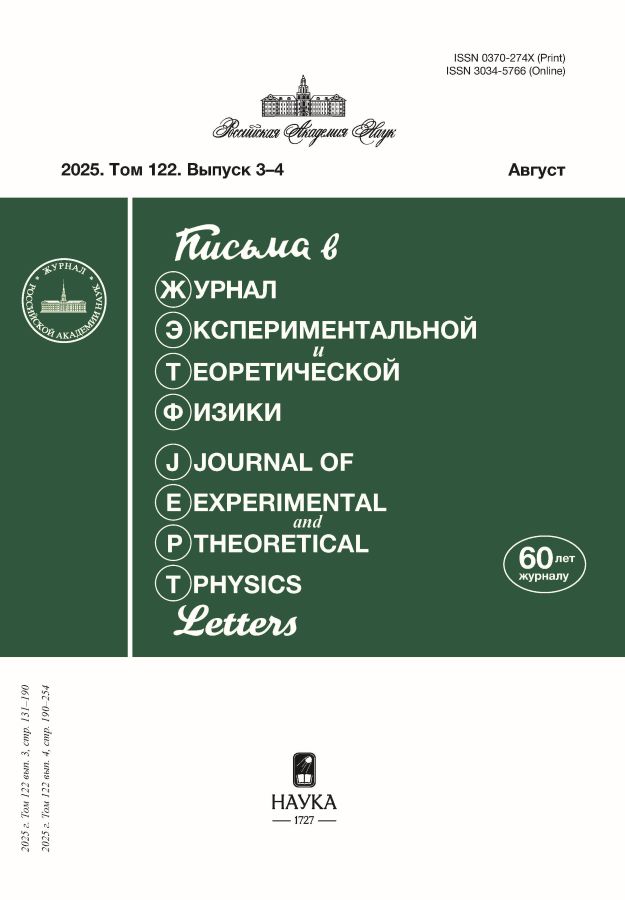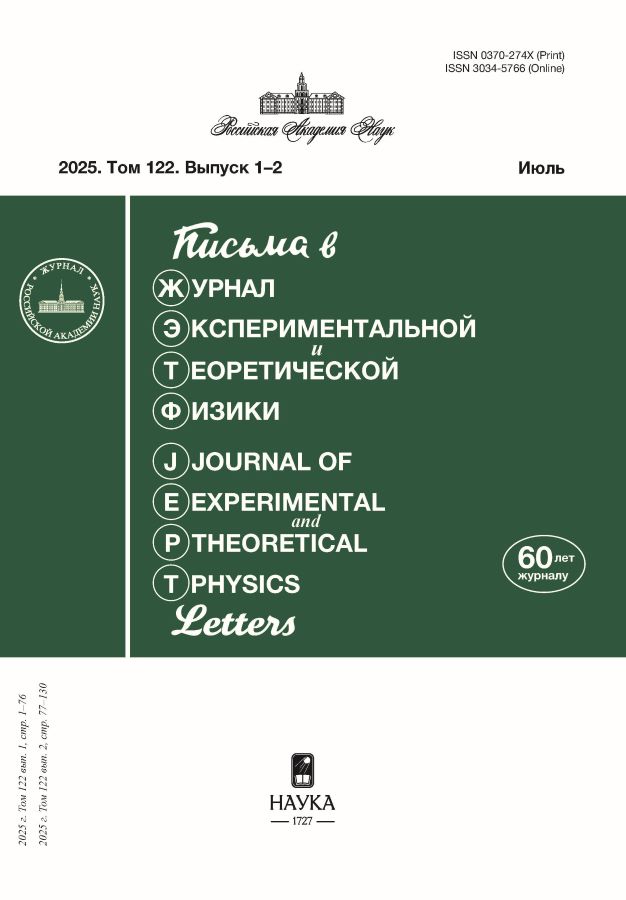NMR evidence for a pseudogap in Pb-doped Bi:2201 single crystal
- Authors: Vyaselev O.M1
-
Affiliations:
- Institute of Solid State Physics, Russian Academy of Sciences
- Issue: Vol 122, No 1-2 (2025)
- Pages: 100-102
- Section: Articles
- URL: https://cardiosomatics.ru/0370-274X/article/view/693447
- DOI: https://doi.org/10.31857/S0370274X25070144
- EDN: https://elibrary.ru/KIYIUK
- ID: 693447
Cite item
Abstract
A 63Cu nuclear magnetic resonance (NMR) study of a Pb-doped Bi:2201 system, Bi1.6Pb0.4Sr2.05CuOy, is presented. The temperature dependencies of the NMR peak shift and the nuclear spin-lattice relaxation (SLR) rate reveal the pseudogap that opens near T* = 60 K, significantly above the superconducting critical temperature Tc ≃ 9 K at the NMR experiment field, 7 T oriented H ∥ c. The noticeable disparity between Tc and T* and the behavior of Cu SLR at T > T* imply the underdoped state of the studied system. A relatively weak effect of the magnetic field on the superconductivity evidenced from small (≈7 K) shift of the zero-field Tc0 = 16 ± 1 K under the applied 7 T field suggests high upper critical field, Hc2, unusual for compounds with as low Tc0.
About the authors
O. M Vyaselev
Institute of Solid State Physics, Russian Academy of Sciences
Author for correspondence.
Email: vyasel@issp.ac.ru
Chernogolovka, Russia
References
- P. C. Hammel, M. Takigawa, R. H. Heffner, Z. Fisk, and K. C. Ott, Phys. Rev. Lett. 63, 1992 (1989).
- M. Takigawa, A. P. Reyes, P. C. Hammel, J. D. Thompson, R. H. Heffner, Z. Fisk, and K. C. Ott, Phys. Rev. B 43, 247 (1991).
- W. W. Warren, R. E. Walstedt, G. F. Brennert, R. J. Cava, R. Tycko, R. F. Bell, and G. Dabbagh, Phys. Rev. Lett. 62, 1193 (1989).
- J. Rossat-Mignod, L. P. Regnault, C. Vettier, P. Bourges, P. Burlet, J. Bossy, J. Y. Henry, and G. Lapertot, J. Magn. Magn. Mater. 116, 336 (1992).
- Ch. Renner, B. Revaz, J.-Y. Genoud, K. Kadowaki, and Ø. Fischer, Phys. Rev. Lett. 80, 149 (1998).
- B. L. Kang, M. Z. Shi, D. Zhao, S. J. Li, J. Li, L. X. Zheng, D. W. Song, L. P. Nie, T. Wu, and X. H. Chen, Chin. Phys. Lett. 39, 127401 (2022).
- C. Varma, Nature 468, 184 (2010).
- V. J. Emery and S. A. Kivelson, Nature 374, 434 (1995).
- K. Gorny, O. M. Vyaselev, J. A. Martindale, V. A. Nandor, C. H. Pennington, P. C. Hammel, W. L. Hults, J. L. Smith, P. L. Kuhns, A. P. Reyes, and W. G. Moulton, Phys. Rev. Lett. 82, 177 (1999).
- V. M. Krasnov, A. Yurgens, D. Winkler, P. Delsing, and T. Claeson, Phys. Rev. Lett. 84, 5860 (2000).
- V. M. Krasnov, Phys. Rev. B 65, 140504 (2002).
- T. Jacobs, S. O. Katterwe, H. Motzkau, A. Rydh, Maljuk, T. Helm, C. Putzke, E. Kampert, M. V. Kartsovnik, and V. M. Krasnov, Phys. Rev. B 86, 214506 (2012).
- B. Fauqu´e, Y. Sidis, V. Hinkov, S. Pailh`es, C. T. Lin, X. Chaud, and P. Bourges, Phys. Rev. Lett. 96, 197001 (2006).
- T. Kondo, T. Takeuchi, A. Kaminski, S. Tsuda, and S. Shin, Phys. Rev. Lett. 98, 267004 (2007).
- M. Roslova, B. Bu¨chner, and A. Maljuk, Crystals 14, 270 (2024).
- G.-q. Zheng, P. L. Kuhns, A. P. Reyes, B. Liang, and C. T. Lin, Phys. Rev. Lett. 94, 047006 (2005).
- K. Ishida, K. Yoshida, T. Mito, Y. Tokunaga, Y. Kitaoka, K. Asayama, Y. Nakayama, J. Shimoyama, and K. Kishio, Phys. Rev. B 58, R5960 (1998).
- Y. Kitaoka, K. Fujiwara, K. Ishida, K. Asayama, Y. Shimakawa, T. Manako, and Y. Kubo, Physica C 179, 107 (1991).
- V. F. Gantmakher, G. A. Emelchenko, I. G. Naumenko, and G. E. Tsydynzhapov, JETP Lett. 72, 21 (2000).
- L. Ya. Vinnikov, A. G. Yukina, V. N. Zverev, D. Shovkun, and A. B. Kulakov, JETP 119, 514 (2014).
Supplementary files











